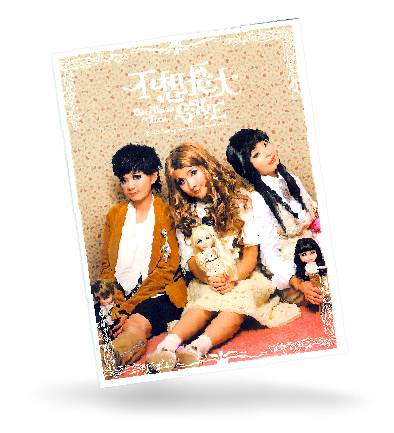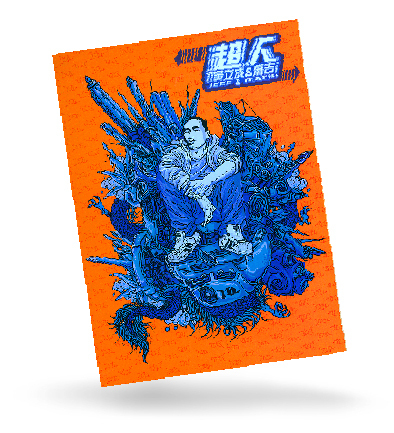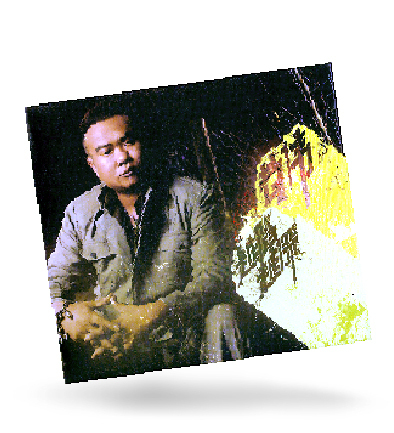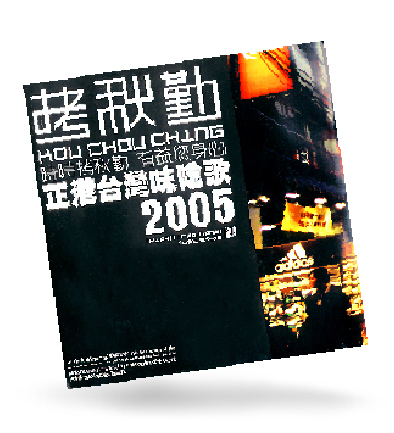S.H.E.
Once Upon a Time(不想長大)
HiM

Having spent the past several months making their acting debuts in the hugely popular ETTV (東森) drama series Reaching for the Stars (真命天女), one of Taiwan's most talked about all girl combos, S.H.E returned to record store shelves this week with a new album entitled Once Upon a Time (不想長大).
Since the trio made its musical debut in 2001 with Girl Friend, Girl Dormitory (
Much of the material is predictable and mundane and unless you happen to be a long time fan of S.H.E. then the album could make you uncomfortable. It should be pointed out, however, that unlike some other well known local female acts, S.H.E can hold a tune.

The highlight of the album is the tune Sharpshooter (神槍手). By mixing basic Mando-pop with traces of nakashi and throwing in an Ennio Morricone spaghetti western-like theme in for good measure, S.H.E has managed to come up with a genuinely unique sound that is comical and entertaining.
Jeff and Machi (黃立成 & 麻吉)
Superman (超人)

Warner
Ex-LA Boy Jeff Huang (
The group has become one of Taiwan's hottest hip-hop acts and its third album, Superman (

If you not a fan of hip-hop then this album is best avoided as, unlike previous releases, where the combo kept it fresh by mixing it up with differing styles, Superman is unadulterated, in-your-face hip-hop. It could be one of the best locally produced Mando-hip-hop albums of the year.
In addition to the Jeff and Machi material, local turntable guru DJ Tommy also gets in on the act with the brilliant Super Machi Remix, which sees the popular DJ getting creative with a whole bunch of Machi material.
With the exception of the DJ Tommy remix the album's other highlight comes when Jeff and Machi veer away from generic North American-like hip-hop and get creative with a more localized sound. While I Love Chou Hsing Hsing (我愛周星星) is certainly not the best "East meets West" musical coupling of all times it does have a catchy tune.
Gou Wei (茍偉)
The Further You Fall the Deeper You Get (越陷越深)
Univresal
OK, so Gou Wei (
The album kicks in with a funky piece of hip-hop that gradually morphs into Mando-pop and then transforms itself into a guitar driven piece of Mando-rock entitled My Style My Show (
Along with his solo material the album also sees the chubby un-pop star like Gou Wei teaming up with Taiwan's Power Station (
Without Turning a Hair (
Kou Chou-ching (拷秋勤)
Taiwan Traditional Music Style (復刻)
Design Fascination
If you're fed up with local acts that lamely attempt to sound like they come from a North American ghetto, then Kou Chou-ching's (
Aptly titled Taiwan Traditional Music Style (
If it sounds a bit odd then you'd be right as the material is so far removed from any and all other types of localized rap that it actually takes some getting used to. Listen to it once and you'll hate it, give it another listen after you've had time to digest what you heard the first time around, however, and you'll be pleasantly surprised.
Kou Chou-ching employs a host of earthy local musical styles, such as nakashi, classical opera and temple music, as well as recording several of the tracks in a gnarly KTV manner. Vocally the combo waxes lyrical, albeit it in a tongue-in-cheek manner, about everything from noodles to red envelopes Sure, not all the tunes are musically pleasing, especially when the group dabbles with instrumentation more commonly associated with funerals, but if your eardrums can withstand the nanguan and cringingly kitsch call-in KTV radio moments then it's well worth it.

Google unveiled an artificial intelligence tool Wednesday that its scientists said would help unravel the mysteries of the human genome — and could one day lead to new treatments for diseases. The deep learning model AlphaGenome was hailed by outside researchers as a “breakthrough” that would let scientists study and even simulate the roots of difficult-to-treat genetic diseases. While the first complete map of the human genome in 2003 “gave us the book of life, reading it remained a challenge,” Pushmeet Kohli, vice president of research at Google DeepMind, told journalists. “We have the text,” he said, which is a sequence of

On a harsh winter afternoon last month, 2,000 protesters marched and chanted slogans such as “CCP out” and “Korea for Koreans” in Seoul’s popular Gangnam District. Participants — mostly students — wore caps printed with the Chinese characters for “exterminate communism” (滅共) and held banners reading “Heaven will destroy the Chinese Communist Party” (天滅中共). During the march, Park Jun-young, the leader of the protest organizer “Free University,” a conservative youth movement, who was on a hunger strike, collapsed after delivering a speech in sub-zero temperatures and was later hospitalized. Several protesters shaved their heads at the end of the demonstration. A

Every now and then, even hardcore hikers like to sleep in, leave the heavy gear at home and just enjoy a relaxed half-day stroll in the mountains: no cold, no steep uphills, no pressure to walk a certain distance in a day. In the winter, the mild climate and lower elevations of the forests in Taiwan’s far south offer a number of easy escapes like this. A prime example is the river above Mudan Reservoir (牡丹水庫): with shallow water, gentle current, abundant wildlife and a complete lack of tourists, this walk is accessible to nearly everyone but still feels quite remote.

In August of 1949 American journalist Darrell Berrigan toured occupied Formosa and on Aug. 13 published “Should We Grab Formosa?” in the Saturday Evening Post. Berrigan, cataloguing the numerous horrors of corruption and looting the occupying Republic of China (ROC) was inflicting on the locals, advocated outright annexation of Taiwan by the US. He contended the islanders would welcome that. Berrigan also observed that the islanders were planning another revolt, and wrote of their “island nationalism.” The US position on Taiwan was well known there, and islanders, he said, had told him of US official statements that Taiwan had not